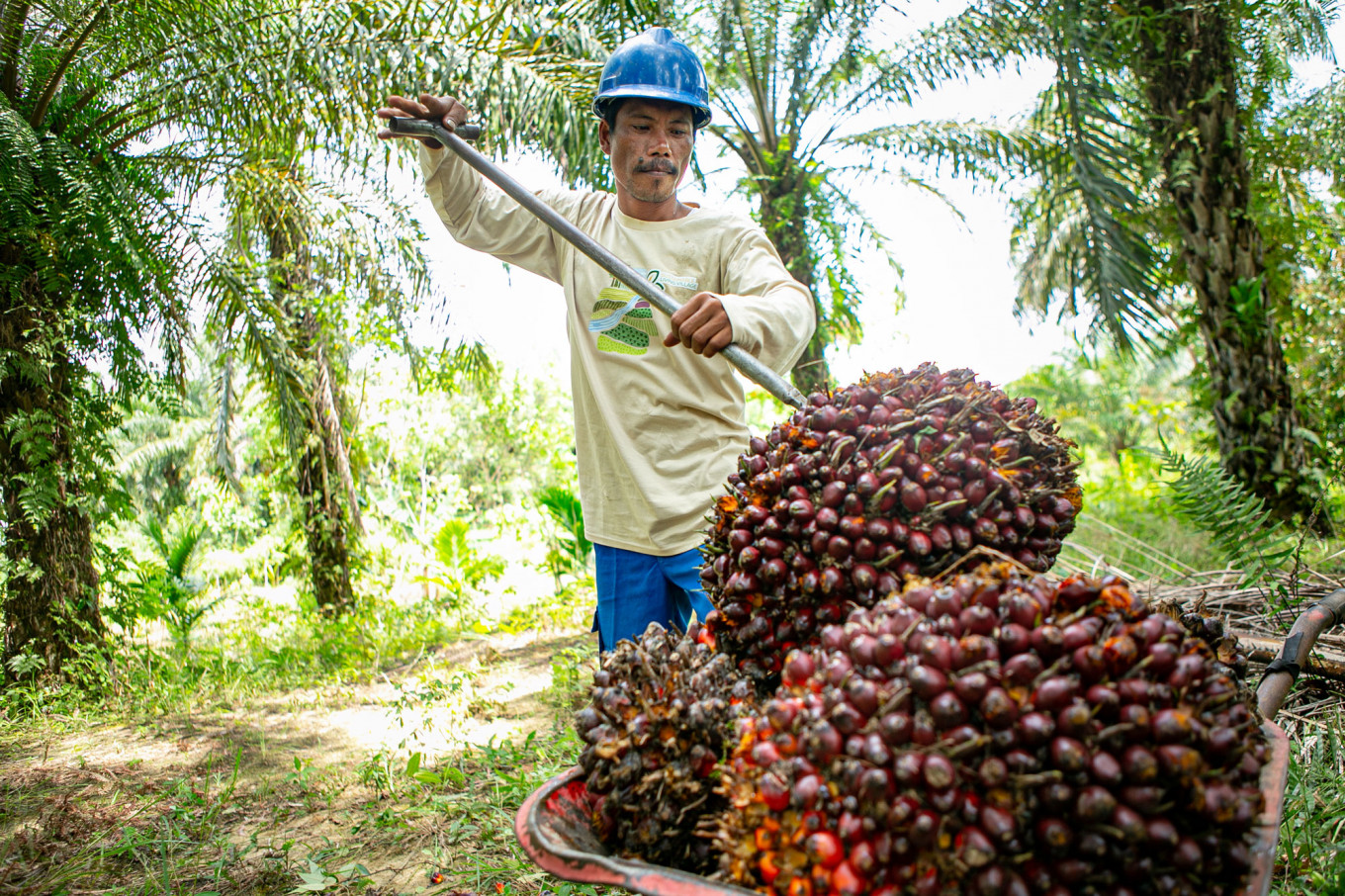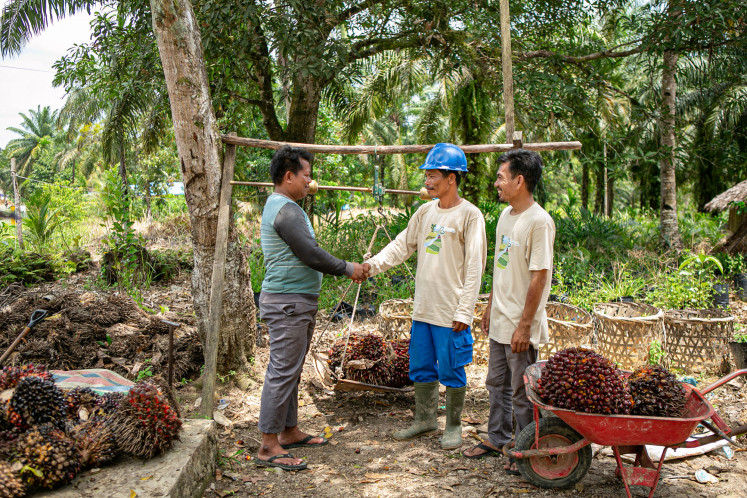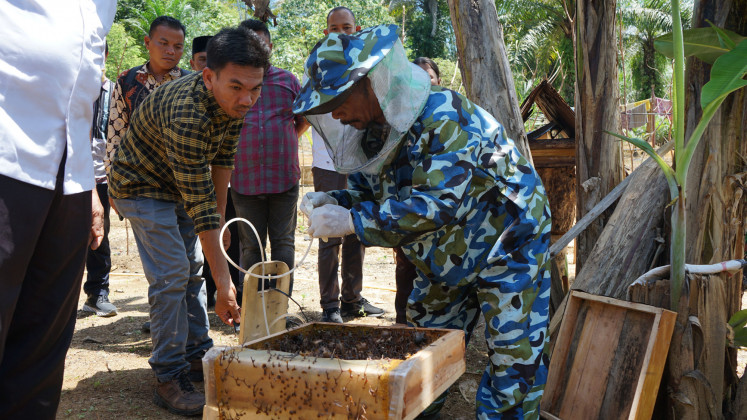Popular Reads
Top Results
Can't find what you're looking for?
View all search resultsPopular Reads
Top Results
Can't find what you're looking for?
View all search resultsApical optimistic about fulfilling 2030 sustainability targets
Change text size
Gift Premium Articles
to Anyone
L
eading vegetable oil processor Apical is optimistic about its sustainability achievements as it reaches the halfway point of its Apical2030 sustainability commitment.
The palm oil downstream arm of the Royal Golden Eagle (RGE) Group launched the Apical2030 commitment in 2022 in line with the United Nations’ Sustainable Development Goals (SDGs), as well as RGE Group’s 5C philosophy to do good for the community, country, climate, customer and company.
In its commitment to create a sustainable, deforestation-free supply chain, the Apical2030 long-term strategy focuses on four main pillars: Transformative Partnerships, Climate Action, Green Innovation and Inclusive Progress.
Entering its third year, Apical has recorded some positive progress in achieving its 2030 targets, driven by environmental and social impacts.
Johan Kurniawan, Director of Corporate Affairs at RGE Palm Business, said the strategic value of palm oil was a key element of the national economy, contributing to foreign exchange as well as the job market. He added that the palm oil industry was integral to improving the welfare of smallholder farmers, especially those in partnership and nucleus-plasma programs.
"As a palm oil processor, Apical operates by prioritizing responsible sustainable principles so that the products produced bring benefits, from household needs such as cooking oil to fuel; in short “Dari Dapur Sampai Avtur" or “from Kitchen to Aviation”” he said, referring to the tag line.
Spurring positive changes
Under the Transformative Partnerships pillar, Apical collaborates with stakeholders across its supply chain in its aim to achieve 100 percent No Deforestation, No Peat and No Exploration (NDPE) by 2025 and 100 percent verified traceability for its suppliers by 2025.
The pillar, which currently has reached 68 percent completion of its targets, also aims to protect and/or conserve 150,000 hectares of forest and peatland in Apical’s sourcing areasby 2030.
According to Hendra Hosea, Apical’s Sustainability Manager, the implementation of Apical2030 is still on track, with 93 percent of all suppliers achieving NDPE as of 2024, while 99.7 percent have achieved traceability to plantation (TT
In addition, 100 percent of the company’s suppliers have been verified for traceability.
As part of its conservation efforts, Apical works closely with local community groups and regional administrations to monitor signs of deforestation in the landscape of the Apical supply chain. The company is also actively promoting clean energy usage for all suppliers, one of the initiatives was through biogas plant commissioning by one of Apical’s suppliers in December 2023.
Putting Earth first
The Climate Action pillar of Apical2030 aims to halve the intensity of greenhouse gases (GHGs) the company emits by 2030 toward achieving net-zero by 2050.
To that end, Apical has succeeded in reducing GHG emissions by 21 percent compared to its 2020 baseline.
Meanwhile, the Green Innovation pillar leverages innovation to create more sustainable operations, aiming to reach 38 percent in the use of energy derived from renewable and clean sources. This pillar also includes improving water use intensity by 30 percent through circular solutions.
According to Hendra, the company has realized 87 percent of this target, with the remaining 13 percent still in progress. To date, 10 percent of the energy Apical uses is derived from renewable and clean sources.
Uplifting communities
Apical also seeks to grow alongside local communities by improving their livelihoods through tailored initiatives. Under the Inclusive Progress pillar, it aims to establish 30 Sustainable Living Villages (SLVs) and support 5,000 independent smallholders in obtaining Roundtable on Sustainable Palm Oil (RSPO) certification by 2030.
To date, the SLV program has reached 12 villages in Aceh Singkil, Aceh, and three villages in East Kutai, East Kalimantan. In addition to empowering communities, reducing poverty and encouraging inclusion, the SLV program also encourages farmers to establish alternative sources of income, such as Trigona honey cultivation in Aceh Singkil and cacao cultivation in East Kutai.
"Through the SLV program, we are committed to helping independent farmers realize sustainable oil palm plantations, one way of which is through training on [cultivation methods] in accordance with the sustainability principles, so farmers can obtain a Cultivation Registration Certificate [STDB] and access development facilities from the government, which are the basis for Indonesian Sustainable Palm Oil [ISPO] and RSPO," Hendra said.
As a credible symbol of sustainable practices, smallholders with RSPO certification can produce more oil using less land. This allows them to reduce the risk of land conversion while also benefiting their livelihoods through improved yield and access to international markets.
In supporting smallholders obtaining RSPO certification, Apical launched the Smallholder Inclusion for better Livelihood & Empowerment (SMILE) program in 2020 in collaboration with Asian Agri and Japan’s Kao Group.
The SMILE program focuses on heightening productivity, increasing incomes and obtaining RSPO certification. As of 2024, the program has involved 3,489 independent smallholders, of which 1,373 have received RSPO certification.













